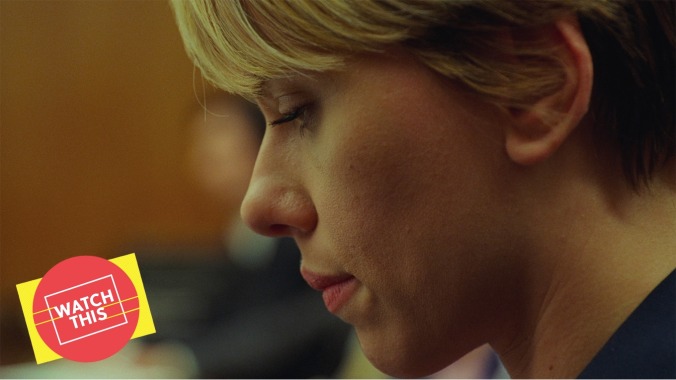Adam Driver got the memes, but Scarlett Johansson is just as crucial to Marriage Story

Watch This offers movie recommendations inspired by new releases, premieres, current events, or occasionally just our own inscrutable whims. This week: With Black Widow postponed, we’re looking back on the best performances by Scarlett Johansson.
Marriage Story (2019)
Adam Driver got a ton of accolades for his performance in last year’s Marriage Story, and rightly so. But despite her own Oscar nomination, Scarlett Johansson went a bit overlooked. It’s a familiar situation for the star, whose beautiful but sometimes expressionless face and deep but verging-on-monotone voice have made it hard for some to appreciate what she brings to a role. But Marriage Story uses Johansson’s apparent remoteness well: As her character, Nicole, subsides to make way for the transformation of Charlie (Driver), the moments when she does light up stand out even more so.
Although it’s Johansson’s face as Nicole we first see on screen, the movie’s perspective eventually shifts dramatically to Charlie, as he navigates his New York life by way of L.A., trying to maintain a relationship with his 8-year-old son, Henry, despite the huge distance that now separates them. In the hands of a less-appealing actor, Nicole could be seen as the villain who uproots her family across the country based on a single TV-pilot opportunity. Before her first scene with Charlie, we hear Johansson’s familiar voice poignantly describing all the things Nicole loves about him. But the image of Nicole we see in the horrible mediator’s office right after that narration is far removed from any sort of affection: Her body is contorted to get as far away from her ex-husband as possible even as he sits in a chair across the room, her expression sullen, her posture simultaneously slumped and twitchy. She makes a run for it as soon as she’s able; her unbridled anger toward Charlie trumps the positive feelings she once had toward him. In an early scene on the set of her new show, we see that Nicole is so worn-down after years with Charlie, she’s barely able to express a completely valid opinion about the character she’s portraying.
We learn why Nicole is in this state through a five-minute monologue delivered to Nora (Laura Dern), her new cutthroat lawyer, explaining why she fell for Charlie, and why she now has to leave. Johansson emits the pure joy Nicole felt during her early days with him (“It was better than sex, the talking”), while rattling off meaningless phrases like “Y’know, everything’s like everything in a relationship, do you find that?” that appear to actually mean the world to her. In a key, Kleenex-clutching moment, Nicole tells Nora that she realized that all the furniture in their apartment had been picked out by Charlie, because “I didn’t even know what my taste was anymore, because I had never been asked to use it.” Johansson effectively translates that point in the marriage where she had to choose between focusing her life around Charlie or herself—and Nicole bravely chose herself, making her a hero instead of a villain. This scene is vital to setting up both sides of Marriage Story, and Johansson’s sympathetic, frequently tearful but determined delivery sells it completely. (Johansson was going through her second divorce at the time of filming.)
That speech is Johansson’s high point in the movie, but if we look back at the film from Nicole’s perspective, there are many key moments that define her relationship with her about-to-be ex-husband, which Johansson delivers with a consistent portrayal of quiet yet effective strength. At one of their meetings with their divorce lawyers, Nicole is resigned to ordering Charlie’s lunch for him as he stares blankly at the menu. He comes to help her with her gate that won’t close, and she generously cuts his hair, just like she used to. Yes, like Charlie, Nicole gets just as riled up during the climactic punching-the-drywall fight, but she goes to his apartment with the best of intentions, carefully laying out the importance of keeping things civil for Henry’s sake. Johansson eventually stands to make her point, but still manages to calmly state Nicole’s reasons for wanting to stay in L.A., belying the snowballing tension. It isn’t until Nicole is faced with Charlie’s stubborn obliviousness yet again that the pair devolves into the vicious fight (Johansson actually jumps in the air with rage when she screams, “I can’t believe I have to know you forever!”)—but as Charlie crumples afterward, it’s Nicole who is compassionate enough to console him.
For Nicole, the move to L.A. is transformative: Even her hair is brighter. There’s a moment at a party where she performs a song from Company with her mom and sister that shows her as absolutely jubilant, miles removed from the shattered, angry character in the mediator’s office. (The performance is the flip side to Charlie’s own song from Company a few scenes later.) By the end of Marriage Story, Charlie makes a career move he never would have made before. Johansson’s Nicole hosts myriad layers of transparent expression upon hearing this news. Without her saying a word, we know that Nicole’s mind is reeling. If Charlie had been able to bend like this earlier, would the divorce have been necessary? But as Johansson expertly navigates Nicole’s journey—through anger, through loss, through finding her own voice again—she’s the success story of Marriage Story, able to pinpoint the complicated emotions in a single, all-too-relatable relationship.
Availability: Marriage Story is streaming on Netflix, and will be available on DVD and Blu-ray through The Criterion Collection on July 20.